Belgium in the Eurovision Song Contest
| Belgium | |
|---|---|
| Member station | VRT, RTBF |
| National selection events |
Eurosong (VRT)
Internal Selection
|
| Participation summary | |
| Appearances | 59 (51 finals) |
| First appearance | 1956 |
| Best result | 1st: 1986 |
| Worst result |
Last: 1961, 1962, 1965, 1973, 1985, 1993, 2000 Nul points: 1962, 1965 |
| External links | |
| Belgium's page at Eurovision.tv | |
|
Belgium in the Eurovision Song Contest 2017 | |
Belgium has participated in the Eurovision Song Contest 59 times since making its debut as one of the seven countries at the first contest in 1956. The only countries with more appearances are Germany (61), France (60) and the United Kingdom (60). Belgium have been absent only three times in total, in 1994, 1997 and 2001, due to low scores in the previous contests that relegated them from the contest. Belgium has won the contest once, in 1986.
In the first 20 years of the contest, Belgium's best result was Tonia's fourth place in 1966. In 1978, Jean Vallée achieved Belgium's first top three placement, when he was second. In 1986, Sandra Kim became the first and to date (as of 2017) only winner for Belgium, when she performed the song J'aime la Vie, to win as a 13-year-old in Bergen. Belgium's only other top three result came in 2003, when the group Urban Trad finished second in Riga, losing out by only two points. Belgium have finished last in the contest five times, most recently in 2000 and have twice received "nul points"; in 1962 and 1965. After the introduction of the semi-final round in 2004, Belgium failed to reach the final οn five consecutive times (2005–09). Since 2010, Belgium have turned their fortunes around, having qualified for the final in five out of eight times and placing in the top 10 four times with Tom Dice finishing sixth in 2010, Loïc Nottet finishing fourth in 2015, Laura Tesoro finishing 10th in 2016, and with Blanche also finishing fourth in 2017.
History
Belgium has two national broadcasters of the contest, Flemish broadcaster Vlaamse Radio- en Televisieomroep (VRT) and French-speaking broadcaster Radio télévision belge de la communauté française (RTBF). The two broadcasters rotate selection for the Eurovision Song Contest each year.
While VRT normally hosts a national final, Eurosong, when selecting their entries for Eurovision, it has been normal for RTBF to hold an internal selection process (although it has been known for RTBF to hold a national final at times, for example in 1998, 2005[1][2] and 2011, while VRT internally chose Tom Dice for the 2010 edition).
Belgium has won the contest once, in 1986 when Sandra Kim won with her song "J'aime la vie" in Bergen, Norway. Although she claimed she was 15 years old, she was actually only 13, but was allowed to keep her victory. Currently the minimum age for participation is 16 and thus Sandra Kim will remain the youngest winner unless the age limit is lowered. By winning in 1986, Belgium became the last of the French-speaking countries to win the contest, as France, Luxembourg, Monaco and Switzerland all had won at least once before. Belgium scored an absolute record at the time, with Sandra Kim earning a never seen before amount of 176 points (that record remained until 1993, with Ireland scoring 187 points), an average of 9.26 points per voting nation. Kim received 77.2% of the maximum possible score, which, as of 2017, still ranks 8th among all Eurovision winners.
Belgium's next best placing has been second which it has achieved twice at the 1978 and 2003 contests. However, it has been last seven times.
In 2003, Urban Trad sang in an invented language earning second place with 165 points, 2 points fewer than that year's winner Turkey. Ishtar did the same in 2008, but came 17th in the first semi-final and thus did not qualify for the final.
2009–2011
In the Eurovision Song Contest 2009 Belgium participated in the first semi-final on 12 May 2009, however they received just one point which came from Armenia and left them in second-last position.
The 2010 entry for Belgium was Tom Dice, runner-up of the Belgian Flemish version of The X Factor in 2008. Dice was internally selected and announced by VRT on 25 November 2009.[3][4] Tom Dice finished 1st in the first semi-final, allowing Belgium to participate to the final for the first time since the introduction of the semi-finals. He eventually finished 6th, Belgium's best result since 2003.[5]
In 2011, the entry for Belgium was Witloof Bay. They didn't qualify for the finals, finishing 11th only one point behind Moldova, and thus 1 point behind the qualification.[6]
2012–14
Due to the good results & the Flemish population's choice, the VRT cancelled 'Eurosong' selection procedure and chose internally for 2012. For the Eurovision Song Contest 2012, they choose 17-year-old singer Iris but decided to let the public choose what song she would sing to represent Belgium. However, she didn't qualify to the finishing 17th of 18 entrants in the first semi-final, scoring just 16 points which was the second lowest total of all the 36 semi-final entrants.[7][8][9]
In 2013, Roberto Bellarosa, winner of The Voice Belgique, was chosen to represent Belgium for the next Eurovision Song Contest to take place in May 2013 in Sweden. Bellarosa made it into the final and finished at the 12th place.[10]
In 2014, VRT organized a national final again[11] and 30 participants were selected to enter the castings. Axel Hirsoux won the national final, with more than 50 percent of the televotes and four times (out of 7 international juries) the maximum of 12 points from the international juries. The song which represented Belgium was called 'Mother' and is a slow ballad.[12] The song failed to qualify for the final, finishing 14th out of 16.
2015–17
In 2015, RTBF chose another "The Voice Belgique" participant Loïc Nottet, who came second in 2014. He represented Belgium with his song Rhythm Inside in the first semi-final of the competition. He managed to qualify and came second with 149 points. In the final Loïc finished fourth with 217 points. It was the best result for Belgium since 2003 and it was the highest amount of points ever awarded to Belgium. It was also the first time ever that an entry who finished fourth scored over 200 points.
On 26 May 2015 VRT confirmed that it would use Eurosong again as the national final for the 2016 competition. This time the show only had 5 participants. Eurosong 2016 would span over 3 shows, but only in the last show people could vote for the entry who would represent Belgium at the Eurovision Song Contest 2016. On 17 January 2016 Laura Tesoro won Eurosong 2016 with her song What's the Pressure, co-written by Belgian singer Selah Sue. Other contenders were Tom Frantzis, Adil Aarab, Amaryllis Uitterlinden and Astrid Destuyver.
Laura Tesoro performed last at the second semi-final on 12 May 2016, and qualified for the final by finishing in third place on 274 points. In the final on 14 May 2016, she performed first and placed tenth on 181 points.
The Wallonian broadcaster RTBF announced on 22 November 2016 that Ellie Delvaux would represent Belgium in the 2017 contest under her stage name Blanche. Blanche also appeared on 'The Voice Belgique" before, just like her predecessors Roberto Bellarosa (2013), Axel Hirsoux (2014) and Loïc Nottet (2015). It will be the fifth consecutive year that the Belgian representative was a former "The Voice" contestant, Laura Tesoro (2016) appeared on the Flemish version "The Voice van Vlaanderen".
On 8 March 2017, the song "City Lights" was officially announced as the Belgian entry for the Eurovision Song Contest 2017. It got leaked the night before, on 7 March 2017, through Spotify. Blanche competed in the first half of the first semi-final on 9 May 2017. She qualified for the final on 13 May and performed in the second half of the show, finishing in fourth place.
2018
During the Eurovision weekend of 2017 Peter Van de Veire announced that VRT would internally select the participant for 2018. De Romeo's had already openly shown interest to participate. Natalia would also like to participate if she was chosen and if she has a good song. Besides these other Flemish artists have shown interest.
Contestants
- Table key
- NOTES
- ^ The full results for the first contest in 1956 are unknown, only the winner was announced. The official Eurovision site lists all the other songs as being placed second.[13]
- ^ If a country had won the previous year, they did not have to compete in the semi-finals the following year. In addition from 2004-2007, the top ten countries who were not members of the big four did not have to compete in the semi-finals the following year. If, for example, Germany and France placed inside the top ten, the countries who placed 11th and 12th were advanced to the following year's grand final along with the rest of the top ten countries.
- ^ Spain originally gave its 12 points to Israel and 10 to Norway. After the broadcast it was announced that Spanish broadcaster wrongly tallied the votes and Germany should have got the top mark - 12 points - instead of being snubbed, as it happened. The mistake was corrected and so Germany was placed 7th over Norway. Israel and Norway both received 2 points less than originally and Croatia, Malta, Portugal, United Kingdom, Netherlands, Belgium, Estonia and Turkey all received one point less than indicated during the broadcast.
Voting history
As of 2017, Belgium's voting history is as follows:
|
| |||||||||||||||||||||||||||||||||||||||||||||||||||||||||||||||||||||||||||||||||||
Hostings
| Year | Location | Venue | Presenter |
|---|---|---|---|
| 1987 | Brussels | Centenary Palace | Viktor Lazlo |
Commentators and spokespersons
Belgium has two broadcast stations VRT (Dutch speaking region) & RTBF (French speaking region). Both broadcast the event and over the years VRT and RTBF commentary has been provided by several experienced radio and television presenters, including Nand Baert, Jacques Mercier, Luc Appermont and Paule Herreman. However, since the 1991 Contest, André Vermeulen has provided the Dutch language commentary every year, with the exception of the 1996 Contest. Whilst Jean-Pierre Hautier has provided the French language commentary every year since the 1994 Contest. In 1962 VRT used the commentary from NOS (The Netherlands broadcast), the reason for that was unknown.
| Year(s) | Flemish Commentator | Walloon Commentator | Spokesperson | Dual Flemish Commentator | Dual Waloon Commentator |
|---|---|---|---|---|---|
| 1956 | Nand Baert | Janine Lambotte | N/A | No Dual Commentator | No Dual Commentator |
| 1957 | Nic Bal | Bert Leysen | |||
| 1958 | Nand Baert | Arlette Vincent | Paule Herreman | ||
| 1959 | Nic Bal | Paule Herreman | Bert Leysen | ||
| 1960 | Georges Désir | Arlette Vincent | |||
| 1961 | Robert Beauvais | Unknown | |||
| 1962 | Willem Duys | Nicole Védrès | Arlette Vincent | ||
| 1963 | Herman Verelst | Pierre Delhasse | Unknown | Denise Maes | |
| 1964 | Paule Herreman | André Hagon | No Dual Commentator | ||
| 1965 | Nand Baert | ||||
| 1966 | André Hagon | ||||
| 1967 | Janine Lambotte | Jan Theys | |||
| 1968 | André Hagon | ||||
| 1969 | Paule Herreman | Ward Bogaert | |||
| 1970 | Claude Delacroix | André Hagon | |||
| 1971 | Janine Lambotte | No spokesperson | |||
| 1972 | Arlette Vincent | ||||
| 1973 | Paule Herreman | ||||
| 1974 | Georges Désir | André Hagon | |||
| 1975 | Paule Herreman | Ward Bogaert | |||
| 1976 | Luc Appermont | Georges Désir | André Hagon | ||
| 1977 | Paule Herreman | Anne Ploegaerts | |||
| 1978 | Claude Delacroix | André Hagon | |||
| 1979 | Paule Herreman | Anne Ploegaerts | |||
| 1980 | Jacques Mercier | Jacques Olivier | |||
| 1981 | Walter De Meyere | ||||
| 1982 | Jacques Olivier | ||||
| 1983 | Anne Ploegaerts | ||||
| 1984 | Jacques Olivier | ||||
| 1985 | Anne Ploegaerts | ||||
| 1986 | Patrick Duhamel | Jacques Olivier | |||
| 1987 | Claude Delacroix | Anne Ploegaerts | |||
| 1988 | Pierre Collard-Bovy | Jacques Olivier | |||
| 1989 | Jacques Mercier | Anne Ploegaerts | |||
| 1990 | Claude Delacroix | Jacques Olivier | |||
| 1991 | André Vermeulen | Anne Ploegaerts | |||
| 1992 | Jacques Olivier | ||||
| 1993 | Anne Ploegaerts | ||||
| 1994 | Jean-Pierre Hautier | Did not participate | |||
| 1995 | Marie-Françoise Renson | ||||
| 1996 | Michel Follet | Anne Ploegaerts | Johan Verstreken | Sandra Kim | |
| 1997 | André Vermeulen | Did not participate | No Dual Commentator | No Dual Commentator | |
| 1998 | Marie-Hélène Vanderborght | Andrea Croonenberghs | |||
| 1999 | Sabine De Vos | Bart Peeters | |||
| 2000 | Thomas Van Hamme | Anja Daems | |||
| 2001 | Did not participate | ||||
| 2002 | Geena Lisa | Bart Peeters | |||
| 2003 | Corinne Boulangier | Anja Daems | |||
| 2004 | Martine Prenen | Bart Peeters | |||
| 2005 | Armelle Gysen | Anja Daems | |||
| 2006 | Yasmine | Bart Peeters | |||
| 2007 | Maureen Louys | Anja Daems | Jean-Louis Lahaye | ||
| 2008 | Sandrine Van Handenhoven | Bart Peeters | |||
| 2009 | Maureen Louys | Anja Daems | |||
| 2010 | Katja Retsin | Bart Peeters | |||
| 2011 | Maureen Louys | Sven Pichal | |||
| 2012 | Peter Van de Veire | ||||
| 2013 | Maureen Louys | Barbara Louys | Tom De Cock | ||
| 2014 | Peter Van de Veire | Angelique Vlieghe | Eva Daeleman | ||
| 2015 | Walid | ||||
| 2016 | Umesh Vangaver | No Dual Commentator | |||
| 2017 | Fanny Gillard | ||||
Additionly since 1998 VRT has supplied a dual commentator to join André Vermeulen, between 1999 and 2010 Dual commentary was provided by Bart Peeters and Anja Daems. Peeters provided the commentary during the years when VRT selected the entries whilst Daems commentated the years RTBF selected the entries. Since 2011 Sven Pichal has replaced Daems as commentator, whilts Peter Van de Veire has replaced Peeters. Since 2007 Jean-Louis Lahaye has joint Jean-Pierre Hautier as dual commentator for RTBF. After Hautier's death in 2012 Lahaye was joined by Maureen Louys in 2013.
Photogallery
See also
- Belgium in the Eurovision Choir of the Year – A competition organised by the EBU for non-professional choirs.
- Belgium in the Junior Eurovision Song Contest – Junior version of the Eurovision Song Contest.
- Belgium in the Eurovision Young Dancers – A competition organised by the EBU for younger dancers aged between 16 and 21.
- Belgium in the Eurovision Young Musicians – A competition organised by the EBU for musicians aged 18 years and younger.
References
- ↑ "Belgian National Final 1998". Archived from the original on 22 October 2009. Retrieved 2009-04-04.
- ↑ "Belgian National Final 2005". Archived from the original on 22 October 2009. Retrieved 2009-04-04.
- ↑ Hondal, Victor (25 November 2009). "Tom Dice to represent Belgium in Oslo". ESCToday. Archived from the original on 28 November 2009. Retrieved 25 November 2009.
- ↑ "Tom Dice gaat naar het Eurovisiesongfestival" (in Dutch). VRT. 25 November 2009. Archived from the original on 29 November 2009. Retrieved 25 November 2009.
- ↑ "Eurovision 2010: complete televoting and jury results". wiwibloggs.com. 30 June 2010. Retrieved 23 March 2014.
- ↑ "Semi-final results at Eurovision 2011". wiwibloggs.com. 15 May 2011. Retrieved 23 March 2014.
- ↑ "Eén begraaft Eurosong als selectie voor het Songfestival" (in Dutch). VRT. 2009-09-09. Archived from the original on 2011-09-27.
|first1=missing|last1=in Authors list (help) - ↑ "No Euroson in 2012 but internal" (in Dutch). 2011-02-14.
|first1=missing|last1=in Authors list (help) - ↑ http://www.eurovision.tv/page/history/by-year/contest?event=1573
- ↑ Griper, Ann (19 May 2013). "Who are Eurovision Song Contest 2013 winners? Full results table". Mirror.co.uk. Retrieved 19 May 2013.
- ↑ "Belgium: VRT confirms participants for Eurosong 2014". wiwibloggs.com. 24 January 2014. Retrieved 23 March 2014.
- ↑ "Belgium: Axel Hirsoux wins Eurosong with 'Mother'". wiwibloggs.com. 16 March 2014. Retrieved 23 March 2014.
- 1 2 3 Barclay, Simon (June 17, 2010). The Complete and Independent Guide to the Eurovision Song Contest 2010. Silverthorn Press. p. 24. ISBN 978-1-4457-8415-1.
External links
- Points to and from Belgium eurovisioncovers.co.uk
.svg.png)
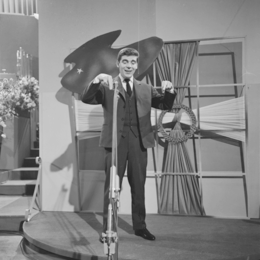
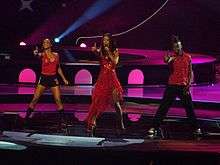
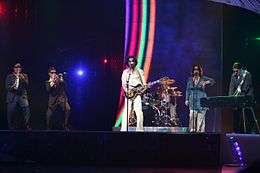


.jpg)

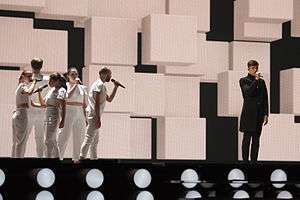
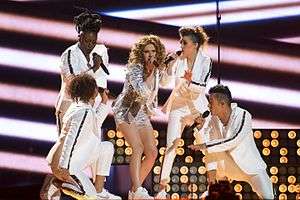
._Photo_380.jpg)